The Secret Grace of Summer Camp for Socially Awkward Storytellers
Thanks to Alec Soth and the team of Little Brown Mushroom, a group of international artists and writers find themselves immersed in finding the stories hiding in plain sight within the marvelous mundanities of the Midwest.
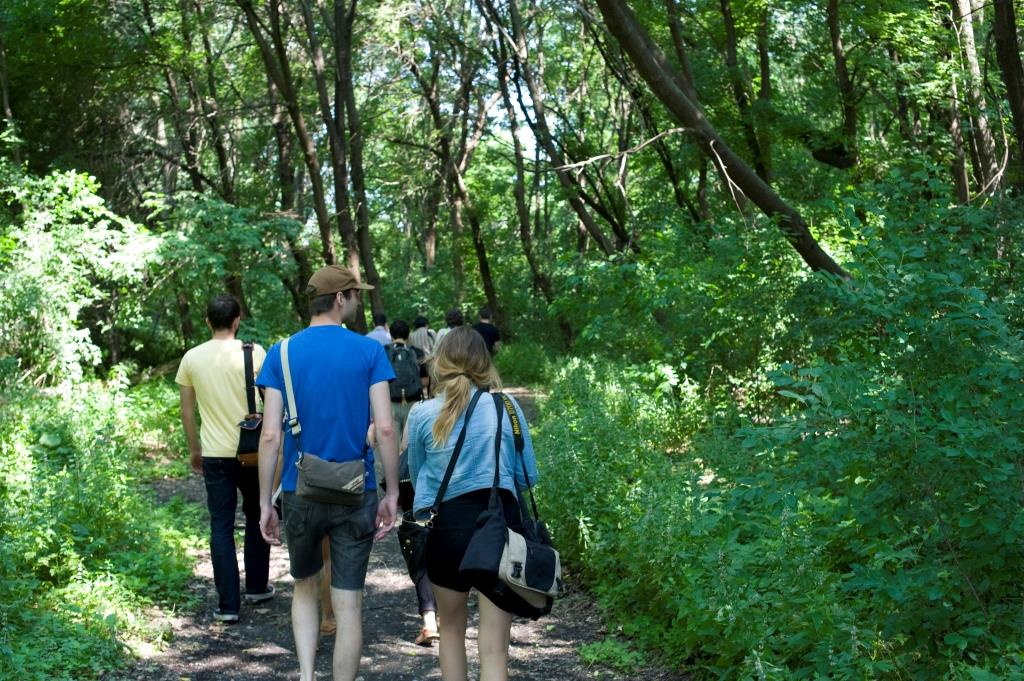
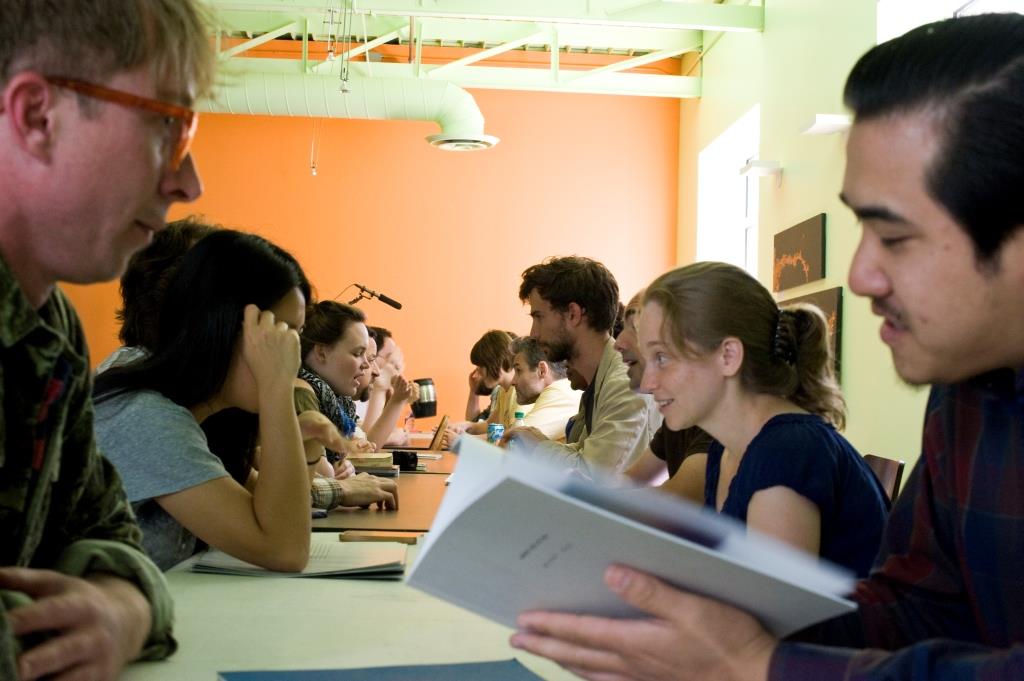
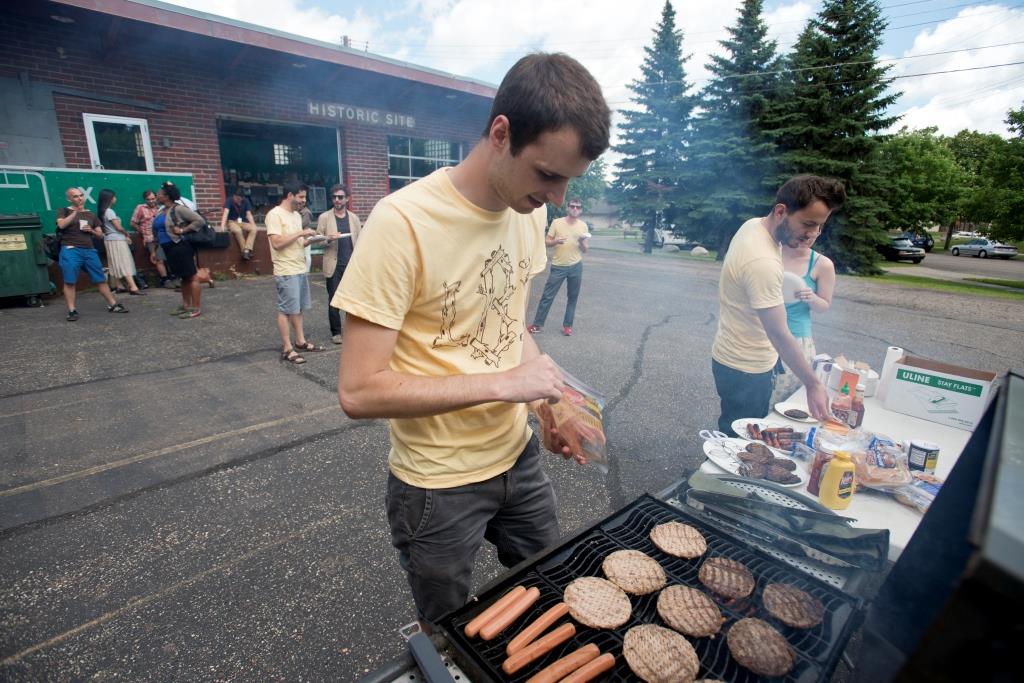
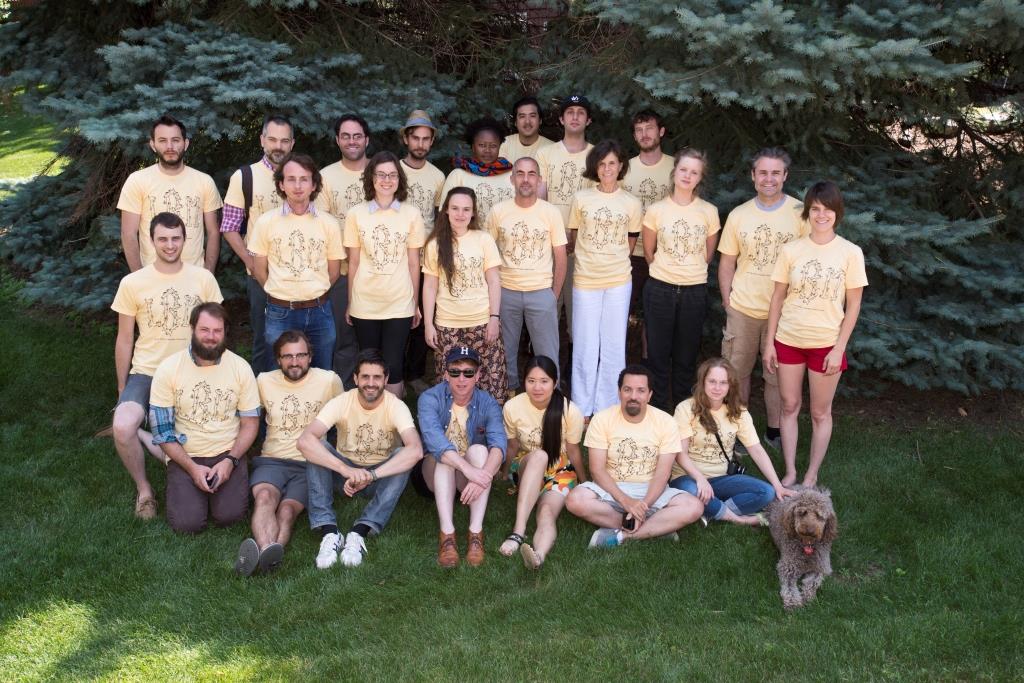
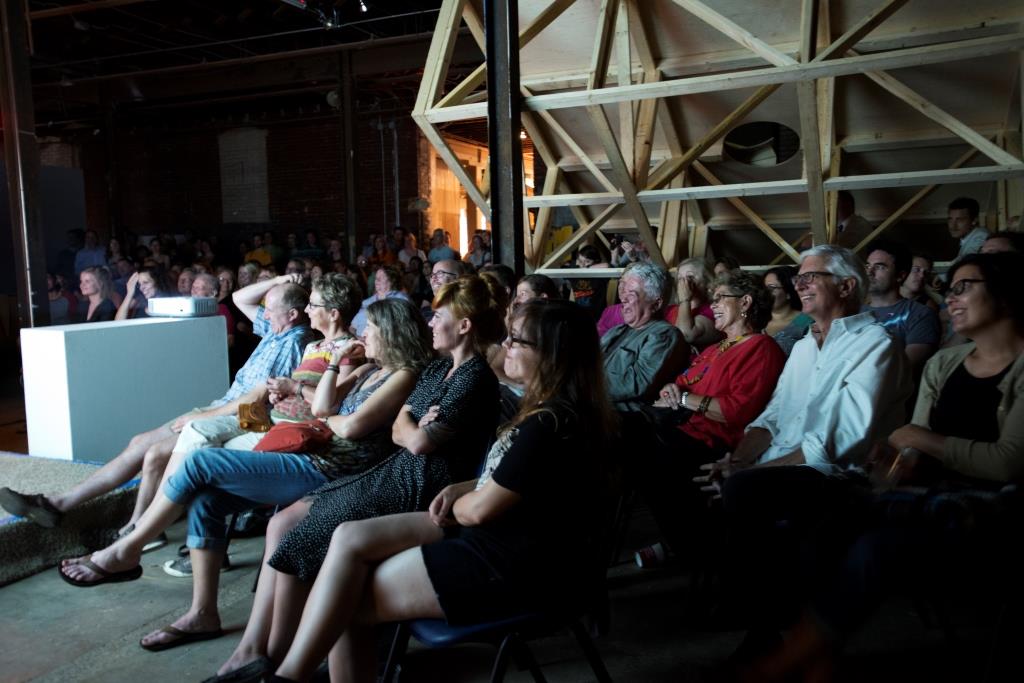
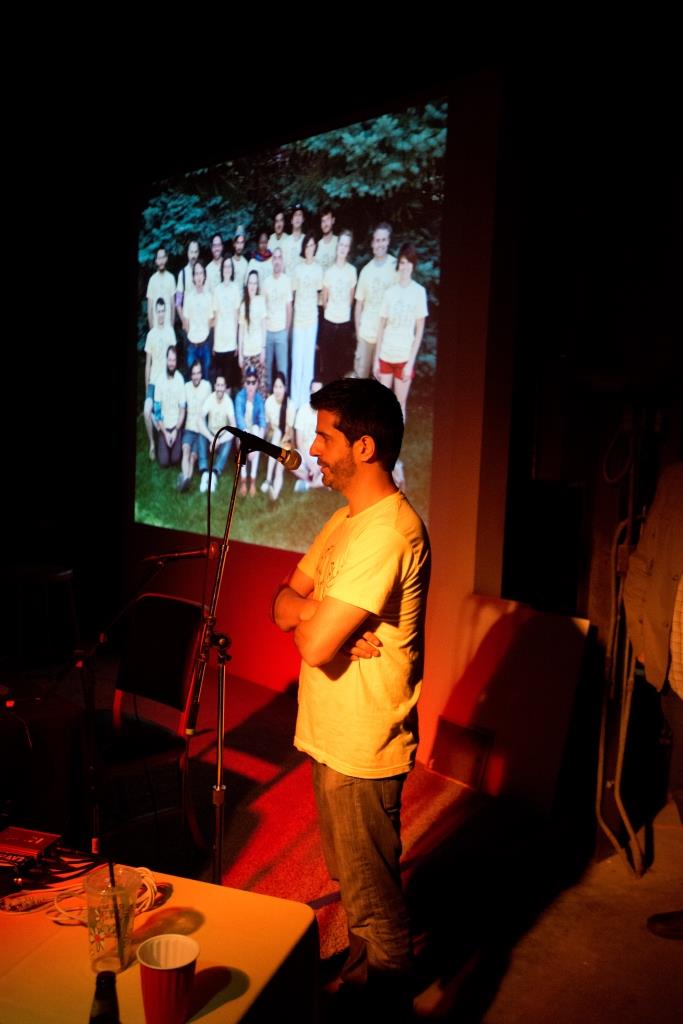
“ALL OF THIS COULD JUST BE A MASSIVE FAILURE, one never knows,” Alec Soth shrugs, his slim frame curled into a Thinker pose as he rests in a swivel chair in the converted garage space that serves as his studio and office. He’s speaking about the Summer Camp for Socially Awkward Storytellers, a recent arts workshop held at Little Brown Mushroom, the Saint Paul publishing house Soth co-founded. His “take it as it comes” attitude is fitting to the project, as Soth and his fellow instructors envisioned the camp as something of a repudiation of the glut of tightly scheduled, for-profit workshops that dominate the photography landscape.
As an internationally celebrated photographer, Soth gets invited to participate in those workshops all the time. “I’ve always avoided them for a variety of reasons,” he says, running a hand over his dark, close-cropped beard. “If it’s somewhere else, I don’t want to just fly off and go do a thing in Cuba or wherever. It always sounds exotic, but then that’s also problematic. They tend to be very expensive for the participants so that it can make money. And that’s fine, but it attracts dentists.”
Affordability and accessibility have always been cornerstones of the Little Brown Mushroom philosophy – their photo essay books generally retail for less than $20, with pricier special editions available for serious collectors. The idea is to produce high-quality artwork that stays in the price range of students, casual arts patrons and other folks who can’t or won’t pony up for the usual high-end art books. Not long ago, it dawned on Soth that the same ethos could be applied to those big-ticket workshops.
“I thought, I keep getting asked to do these workshops, but what if I did a workshop here? Because I’m hungry to be involved in education in some way, but I also want to do it on my own terms,” Soth explains. Once the seed was planted, the framework came together quickly: Little Brown Mushroom would invite artists to apply for a free, five-day workshop based in the cozily industrial confines of the company’s Saint Paul offices. Making the workshop cost-free was hugely important, not just because it kept things affordable for the applicants, but also because it provided Soth and his collaborators with a little more room to move. “It relieves some of the burden of having to fulfill a specific expectation,” Soth says. “It’s free to be more experimental. Also, it allowed us to cherry-pick really interesting applications. We got a ton of applications, really fascinating ones. We could’ve done it 20 times over. The only negative to this whole process so far has been saying no to people with these wonderful applications.”
That freedom also allowed the Summer Camp for Socially Awkward Storytellers to focus on perhaps the stickiest aspect of the Little Brown Mushroom mission: exploring the possibilities of photo-centric narratives. In a side room the staff refers to as “The Cave” stands Soth’s sizable collection of photography books. The library ranges from well-known classics to recent obscurities, but in Soth’s eyes the real jewels are a smattering of books that attempt to wed photos to some sort of overarching narrative. There are children’s books, Mexican fotonovelas, even a few more adult-oriented artistic efforts like Daniel Seymour’s A Loud Song. Soth has long explored the intersection of storytelling and photography in his own work, most recently in his series of LBM Dispatch collaborations with author and Little Brown Mushroom team member Brad Zellar.
“The thing about Little Brown Mushroom is it’s always a combination of text and image,” Soth says. “We use a storybook, like Little Golden Books, as sort of a template for visual storytelling. It’s really storytelling at its most basic form. And then something like these “dispatches,” that’s more modeled after newspaper journalism, but also something like Life photo essays. It’s kind of a dated thing, but Dorthea Lange and Paul Taylor collaborated, Margaret Bourke-White and Erskine Caldwell, these writer-photographer collaborations. It’s kind of a bygone era.”
__________________________________________________
You don’t have to go to Cuba to find exotic people and places. It’s exotic right here. Menards is very interesting. One can do a photo workshop here in the Midwest as well as anywhere else. In some ways it’s better, because it helps you avoid some of the clichés of these sorts of stories.
__________________________________________________
Despite Soth’s fascination with and enthusiasm for narrative photography, he’s not convinced that it’s a particularly effective format. “Truthfully,” he says, “I don’t think they go together very well, images and text. I think they fight each other. But I feel hungry for it. As an artist, [this workshop] is a way for me to play around and experiment with other artists in terms of, ‘what are the possibilities of this?’”
With that loose mission statement in hand, Soth and the Summer Camp for Socially Awkward Storytellers staff – Zellar, photographers Carrie Thompson and Ethan Jones, designer Hans Seeger, visual artist Jason Polan and filmmaker Galen Fletcher – sorted through the more than 400 applications and picked out 15 attendees from all around the world. The final roster included artists from corners as far-flung as Germany and Venezuela, with just one Minnesotan in the mix. (In the interest of getting as diverse a selection of perspectives as possible, the staff intentionally decided to limit the locals and only consider applicants with whose work they were unfamiliar.)
The campers roll in on Tuesday with little idea of what to expect from the undertaking. Much of their trepidation has to do with working in teams. “Collaboration is kind of a new thing for me,” says Jeff Barnett-Winsby, a photographer from New York. “But it’s definitely something that I’ve been enjoying. I think a lot of photographers [are concerned that], because our work is so representational, it’s also easily replicated or at least emulated. It makes for a really insecure artist. Those artists are notoriously bad at collaborating, because you have to give up control and authorship. I think we did a really great job — but maybe I’m just talking about me.”
When we speak, before camp starts, Soth admits that he himself has only a basic idea of how the week will unfold. “We’re going to pair people off for the first day to do little collaborative projects. Ideally we’ll get as much of a mix of mediums between those people as possible,” Soth explains. “They go out and they have to generate some sort of story. It can be a very simple thing… It’s like a children’s book, the primal form of storytelling. Like, ‘I went to Hawaii. I saw the dolphin.’ Except in a more sophisticated way: ‘I went to Menards. I photographed someone in a wedding dress.’”
He’s not kidding about Menards, either. Exploring the untapped wonders of Saint Paul, especially the nearby Saint Anthony and Midway neighborhoods, is very much a part of the workshop agenda. William Faulkner once said that a key to his success as a novelist was the realization that “my own little postage stamp of soil was worth writing about and that I would never live long enough to exhaust it.” Soth clearly abides by a similar philosophy.
“They’re going out in this vicinity,” he says. “A big belief of mine is that I don’t have to go to Cuba to do a photo workshop, or to see the exotic people. It’s exotic here. It’s interesting. Menards is very interesting. One can do a photo workshop here as well as anywhere else. In some ways it helps to avoid some of the clichés.”
And so it is that a group of international artists and writers find themselves checking in at Al’s Diner in Dinkytown, wandering the woods outside of the city and otherwise immersed in the marvelous mundanities of the Midwest. The unstructured nature of the undertaking foments some peculiar – and, it seems, welcome – digressions. Easter Trouble Press founder Jim Reed, a fan of Soth’s work who traveled from Frankfort, Germany to take part in the camp, finds himself inspired to experiment with William Eggleston’s “democratic camera” concept during the group’s trip to the forest. “I decided I’m going to drink beer and get intoxicated, in the spirit of Eggleston, and go around and sit and stare at objects, try to give objects their full worth the way that Eggleston gave objects their full worth,” Reed says. He eventually evolves that idea into a sort of conceptual Easter egg hunt for the other campers.
There are probably a lot of arts workshops where that sort of thing wouldn’t fly, but as far as Soth is concerned, anything that helps an artist tap into a vein of storytelling is fair game. “Part of the name, the whole ‘Socially Awkward’ thing, is that photographers and writers are generally more reclusive people. Certainly I was. That’s part of my reason for doing it. But I am interested in storytelling as communication. Wouldn’t it be interesting just to experiment with this form of presenting material in a slideshow? And in part it comes from personal experience, because I’ve been forced into this situation. I’m not saying I’m good at it at all. I give the standard slideshow, like an artist’s lecture. But I thought there was potential here for something.”
From the look of things around the Little Brown Mushroom offices on Wednesday evening, after the second full day of workshops, the campers are finding the challenge daunting but are eager to rise to it. A dimly lit back room hums with quiet energy as duos hunch over MacBooks and try to pull loose narratives out of their day’s outing in the forest. Soth and some Little Brown Mushroom staffers mill about up front, chatting about upcoming projects and allowing the artists to go well over their allotted work time.
It’s pushing on past 8 pm when the instructors finally give the “pencils down” call. The campers have prepared a series of slideshows in which they’ve tied their photos together with some manner of narrative thread. It’s a practice run for the camp’s grand finale, a live slideshow event in front of an audience at The Soap Factory, complete with a DJ set by Brad Zellar and snappy patter from comedian Brian Beatty. The campers, who didn’t know coming in that there would be a performance element, seem both sheepish about sharing their day’s output and grateful for the chance to get in a few dry runs before the big event. While they come from a broad range of artistic backgrounds, theater is not the first item on anyone’s résumé. The storytelling is loose, brief and laced with in-jokes that make it clear that the group already has a fair bit of bonding under its collective belt. There are still plenty of bugs to work out, but it appears as though they’re making heady progress toward Soth’s goal of unearthing some new revelations about photographic narrative.
“I think it’ll be fun,” Soth says of the then fast-approaching performance. “Part of the thing about showing it to an audience is, it’s not that you have to entertain, but you have to engage on some level. I think there’s a tendency in the art world to sort of forget about the audience. ‘I’m doing this for myself.’ If you’re faced with an audience, there’s some sort of obligation to engage with them on some level. Make it compelling, so it’s not utterly boring. But maybe even making it boring is OK. If you choose to do that, that’s OK.”
That last sentence could be a thesis statement for the Camp for Socially Awkward Storytellers, and that overriding sense of OK-ness seems like a solid groundwork for many more camps to come.
__________________________________________________
Related links and noted event details:
Little Brown Mushroom’s Summer Camp for Socially Awkward Storytellers ran from July 9 through 13. The camp culminated with an event, The Socially Awkward Storytellers’ Slideshow and Dance, on Saturday, July 13 at 7 p.m. at the Soap Factory in Minneapolis. For more information, visit www.littlebrownmushroom.com.
__________________________________________________
About the author: Ira Brooker is a writer and editor residing in Saint Paul’s scenic Midway neighborhood. He has been published in a number of venues both local and national, several of which you may have even heard of. He currently edits Minnesota Playlist, maintains an archive at irabrooker.com and occasionally prattles on about pop culture at A Talent For Idleness.